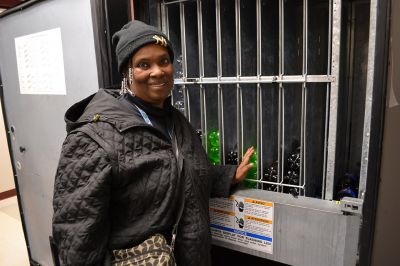Home »
Referrals
We have an array of services for people of all abilities at Community Services. Some requirements are listed below, but please contact us for your specific case.
Our referrals department is located at:
452 Delaware Avenue
Buffalo, New York 14202
For a list of our services and contacts, download our Program Summary.
If you need further assistance, you can call the office at (716) 883-8002. FAX information to (716) 883-2065.

We offer Health Homes, which is a care management service that connects all of your health professionals to improve communication and makes sure your needs are met. View our flyer and brochure below to see how you or your loved one may qualify.
OPWDD Requirements
The following are criteria required by New York State Office for People With Developmental Disabilities (OPWDD). The criteria must be met in order for New York State to approve eligibility for services. New York State OPWDD will review all records submitted to determine whether the applicant is eligible for services.
The Referrals caseworker at Community Services for Every1 will assist with gathering the needed documents and necessary testing. Upon receiving the paperwork, the caseworker will send the file to New York State OPWDD for eligibility determination.
- Prior to age 22- proof of Disability:
- School records, proof of Special Education/IEP, school psychological reports with I.Q., and other school adaptive functioning assessments and reports.
- Pediatric, primary physician, or other specialists medical records documenting the disability.
- If no school records exist then a letter from an involved family member attesting to the disability with detailed description of functional deficits and school history. Community Services provides an outline for this statement.
- Current proof of Disability:
- Updated psychological testing with an IQ of 69 or below to prove Intellectual Disability.
- Updated diagnostic testing (CT brain scan, MRI imaging) to prove neurological impairments, brain injury, or seizure disorders.
- Childhood Autism Rating Scale Second Edition (CARS-2), Autism Diagnostic Observation Schedule (ADOS), or Autism Diagnostic Interview-Revised (ADI-R) Testing to confirm Autism Disorders.
- Current medical records, medical treatment records, and therapy reports to confirm Cerebral Palsy and Seizure Disorders.
- Current adaptive functioning assessments.
- Psychiatric treatment records if applicable.
- Substance abuse treatment and counseling records if applicable.
Community Services consults with a Psychologist to conduct testing and assessments.
OPWDD Eligibility Review Process
- Your information will be reviewed by the Eligibility Review Committee of New York State. There, they will review all of your information and determine whether you have a qualifying developmental disability and if you are eligible for services. This review process can take several months. Upon their decision, you will receive a letter of approval.
- Sometimes the committee cannot determine a decision and they request more information. We will work with you to obtain what the committee needs.
Qualifying OPWDD Developmental Disabilities
The following are the developmental disabilities that qualify a person for services with the OPWDD:
- Intellectual Disability– the person must have an IQ of 69 or below.
- Cerebral Palsy– caused by damage to the brain and affects the control of muscles.
- Seizure Disorder- seizure activity which impairs the daily functions of the person.
- Autism- a group of disorders that can impair multiple areas, including communication, social integration and sensory reaction.
- Neurological Impairment – a group of disorders of the brain and nervous system which impairs multiple functions of the brain including memory, attention and understanding. These conditions must be proven to limit the daily functioning of the person. Examples include- substantial learning disabilities, and Traumatic Brain Injury.
- Familial Dysautonomia- a genetic disability predominant in eastern European oriented children that affects the autonomic and sensory nervous systems. Symptoms vary among patients.
Community Services for Every1 operates its programs, services, and activities in compliance with federal nondiscrimination laws including Title VI of the Civil Rights Act of 1964 (Title VI), the Civil Rights Restoration Act of 1987, and related statutes and regulations.
Title VI prohibits discrimination in federally assisted programs and requires that no person in the United States of America shall, on the grounds of race, color, or national origin (including limited English proficiency), be excluded from participation in, be denied the benefits of, or be otherwise subjected to discrimination under any program or activity receiving federal assistance.
More information on Title VI and the Civil Rights Act of 1964 can be found on the United States Justice Department website at http://www.justice.gov/crt/about/cor/coord/titlevi.php
To file a complaint alleging a violation of the Title VI of the Civil Rights Act of 1964, please contact the Agency Corporate Compliance officer via mail at:
Corporate Compliance Officer
Community Services for Every1
180 Oak Street
Buffalo, NY 14203










